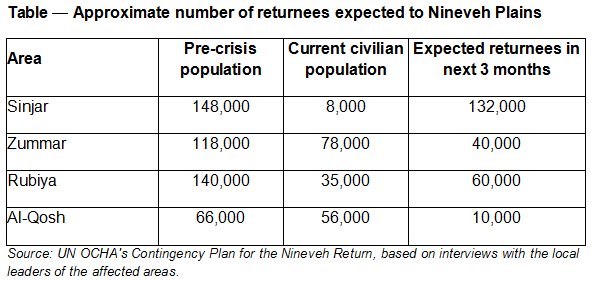Many families that were displaced from Iraq’s Nineveh Governorate to the Kurdistan Region due to the surge of ISIS are preparing to go back home. As the Peshmerga have recaptured much of Nineveh’s northern districts, it has raised the prospect of mass returns to the areas of Sinjar, Zummar, Rubiya and al-Qosh. This needs a re-shift of the aid coordination, that was until now primarily focused on how to shelter and protect 2 million Internally Displaced People (IDPs). The UN-related agencies have been hurrying these last days a 3-month contingency plan to coordinate efforts with all humanitarian stakeholders to smooth this return home. However, two challenges resonate in the minds of policy-makers and aid practitioners: social cohesion and opportunities to re-start a normal life.
This sudden eagerness of many families to return can be probably explained by a combination of factors. On one side, a feeling that their properties are threatened by those who remain in Nineveh—mainly Sunni tribesmen that returnees view with suspicion. On the other side, because of the harsh living conditions that the KRG imposed upon them by not adopting any long-term policy to absorb the influx of IDPs. In any case, according to the mayors of the northern sub-districts of Nineveh, up to 240,000 IDPs are expected to return to their homes in the coming months, assuming that current lines of control between Peshmerga and ISIS are maintained. The table below summarises the figures used for planning purposes per sub-district. In overall, these figures would suggest that near 90% of the displaced people would return. Although figures could be subjected to some exaggeration by the local communities to gain momentum, the actual number of families would still be significant.
On-the-ground information is scarcely available, but it is expected that returnees will find a lack of public services, disrupted markets, a significant part of the houses damaged, a still insecure environment, lack of the necessary inputs for re-taking activities such as farming, weak rule of law and an absence of government. In short, lack of opportunities. Combine this with the wounds of conflict that still remain raw and we have the perfect combination to deepen further the protracted social tensions on ethnic-religious lines.
How to effectively address the rise of tensions and conflict between stayees and returnees? Instead of direct peace-building initiatives that may actually add more fuel to the fire due to the volatile situation, the humanitarian community seems to be rightly prioritising social cohesion through an indirect approach. It relies on promoting economic opportunities, granting access to restored public services, developing income-generating activities, providing new skills for a fresh start, etc. In the jargon of the humanitarian community: give people livelihoods.
Promoting livelihood opportunities reduces the chances of exclusion, frustration or competition with other groups. At the same time, this nurtures certain interdependence and interconnectivity among the diverse groups across the same value chain, as economic well-being ends up depending on what each distinct community delivers to the whole—what is called a shared society. This approach on livelihood promotion becomes then a mean to achieve a peaceful co-existence. There is a strong link, in essence, between economic recovery and social cohesion, and this can be applied to the return of IDPs to Nineveh.
* * * * *
About MERI: The Middle East Research Institute is Iraq’s leading policy-research institute and think tank. It is an independent, entirely grant-funded not-for-profit organisation, based in Erbil, Kurdistan Region. Its mission is to contribute to the process of nation-building, state-building and democratisation via engagement, research, analysis and policy debates.
MERI’s main objectives include promoting and developing human rights, good governance, the rule of law and social and economic prosperity. MERI conduct high impact, high quality research (including purpose-based field work) and has published extensively in areas of: human rights, government reform, international politics, national security, ISIS, refugees, IDPs, minority rights (Christians, Yezidis, Turkmen, Shabaks, Sabi mandeans), Baghdad-Erbil relations, Hashd Al-Shabi, Peshmarga, violence against women, civil society. MERI engages policy- and decision-makers, the civil society and general public via publication, focused group discussions and conferences (MERI Forum).


